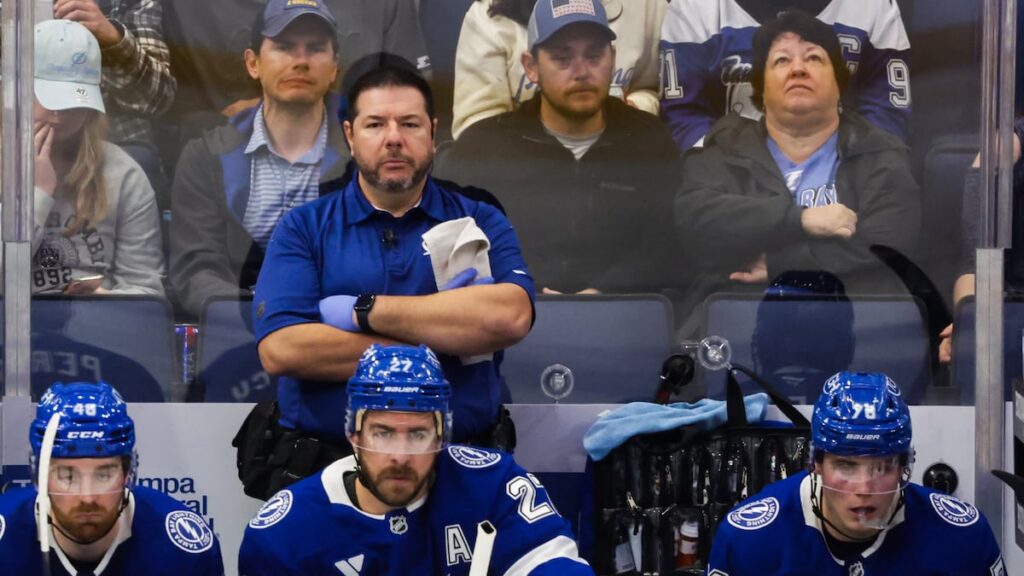When Tom Mulligan joined the Lightning as the team’s head athletic trainer in the summer of 2002 at age 28, he didn’t expect to stay for the next two decades. He was simply setting out to do the best job he could every day.
“I never thought, ‘OK, this is what I want to do in 10 years, 20 years,” Mulligan said. “I still don’t look at it that way. It probably goes against what a lot of people say about having long-term goals. For me, it’s always been living in the now and just being the best you can be now.”
Staying Present and Successful
Now, Mulligan is one of the behind-the-scenes bedrocks of the Lightning’s success. Also the team’s director of sports medicine, he is responsible for keeping players healthy and treating their injuries. He’s one of the first people to the rink every day and one of the last done with his duties, even on off days.
“Mully’s been a mainstay here,” Lightning coach Jon Cooper said. “He’s seen all the Cups. He’s seen the ups and downs. … When you’re winning Stanley Cups and when you’re having success, it’s not just the players. Whether it’s the coaches, the trainers, equipment (managers), everybody, there’s a synergy within the group. And Mully is really positive, and he has that effect on everybody around him. The guys love him, and he’s really good at his job.”
Focus on Trust
To Mulligan, having players’ trust has been paramount to his success and longevity. And in a tough-guy sport where players push through physical ailments, especially during the playoffs, he is the ultimate voice of reason.
“There’s a fine line we walk, because in order to be successful on the medical side you have to have the players’ trust in what you’re doing,” Mulligan said. “It’s their career, and their career’s in your hands and you have to ensure that they’re making right decisions for their part.
“But at the same time, you’re employed by the organization and you have to walk that fine line of doing what’s right for the organization. What I’ve been really lucky in is that our organization, through the years, has really put players first.”
Navigating Injuries and Playoffs
During the Lightning’s run to the Cup in 2021, defenseman Victor Hedman suffered a meniscus tear late in the regular season. He played the final 19 games and 23 playoff games, helping lead the team become just the second to win back-to-back titles in the salary-cap era.
Mulligan said the postseason is his favorite time, since most players are battling some sort of injury. During the regular season, there’s a conservative approach to recovery, focusing on the long-term prognosis. But in the playoffs, it’s about getting through the next game.
“That’s where the trust comes in,” Mulligan said, “And you have to be completely transparent and say, ‘OK, this is your injury. We can get you to be able to play tonight. But, A, you have to be able to function on the ice and B, we’ve got to make sure this isn’t going to lead to a long-term problem that could potentially affect your career. You lay it all out there.”
In Hedman’s case, his knee could lock up with the slightest movement, so he worked with Mulligan and assistant athletic trainer Mike Poirier (who worked alongside Mulligan for 16 years) to find a tape job that would stabilize his knee to get him through the most physically taxing part of the season.
“Those guys have seen it all, and they usually know what it takes to make it as good as it can be so you can play on it,” Hedman said. “A meniscus tear or an ACL or MCL, those are stuff that you can try to gut through, and they make everything available for us. It’s super important for us to be out there in the playoffs. and they do whatever they can to help put us out there.”
An injured AC joint in his right knee plagued Paul throughout the 2022 postseason.
“I was in there all the time working on it, getting treatment, figuring out ways where it just hurts the least,” Paul said. “But that’s where you go in there and you’ve just got to figure it out. It’s you and him, and you’re like, ‘Alright, how are we going to do this? How am I going to play the best hockey here with the most movement and the least amount of pain?’ It’s all trust.”
Personal and Professional Growth
Mulligan, who grew up in Massachusetts as a Bruins fan, spent his first four seasons in pro hockey as head athletic trainer for the organization’s AHL affiliate in Providence. The team won a Calder Cup in his first season, 1999.
In 2002, a friend told Mulligan about an opening with the Lightning. He sent in his application to then-general manager Jay Feaster. Providence coach Peter Laviolette, now the Rangers’ coach, put in a good word with John Tortorella, the Lightning coach at the time.
In just his second season in Tampa Bay, Mulligan was lifting the Stanley Cup over his head. His oldest son, Tyler, was 1 at the time. It took 16 years for the Lightning to win another Cup, and by then Mulligan was a father of three.
When the Lightning won in 2020, it was in the isolation of the playoff bubble during COVID. But when they repeated as champs the following season, his family — wife Kellie and children Tyler, Zachary and Abby — was able to celebrate with him on the ice at Amalie Arena.
“You had ups and downs through those next 16 years, and some tough years and tough years injury-wise and what we were dealing with and the sacrifices at home and the family, your wife and the kids with dad not being around a lot, and you always hoped they could all experience it someday, that they could be a part of, being on ice and being part of the celebration,” Mulligan said. “It all came full circle.”
Navigating Challenges
Mulligan played an additional role during the Lightning’s 2020 and ‘21 Cup runs. As the team’s COVID compliance officer, he was jokingly referred to as the “COVID police.” It was his job to make sure everyone in the bubble wore masks and adhered to the isolation mandates.
“That was a challenge, and I took it personal,” Mulligan said. “I didn’t want our group to be the one that would shut down the bubble or have a massive breakout here.”
But Mulligan said the abbreviated 56-game season in 2021 was even more difficult. Teams were traveling again, and Florida was wide-open. Teams took over testing, which was still being done every day, and Mulligan had to make sure players and staff were still isolating away from the team and didn’t go out to restaurants, risking positive tests.
“I remember sitting some nights in hotel rooms,” Mulligan said. “We had a positive test come through one night down in South Florida at 12:30 in the morning. You’re on the phone with the league’s medical director, ‘OK, here’s what we have. Here’s what we’re going to do.’ That player had to drive back to Tampa separately. When you look at winning the Cup that year, that played a big part in the satisfaction of winning, just what we had to go through from that standpoint.”
The trust players and staff had in Mulligan came through. His message focused on explaining the bigger picture, that the risk of a positive test and COVID spreading through the team and shutting down games could affect the Lightning’s goal of making history as repeat champions.
“He had the worst job out of all of us,” Cooper said. “I remember thinking, ‘Man, I don’t want to be in his shoes, corralling the herd.’ But it was seamless, and I think you add all those things up and it just makes life just a little bit easier, which lets you focus on things that you don’t have to worry about. And then it lets you focus on your game. That’s what Mully does for us.”
• • •
Conclusion
Tom Mulligan’s journey with the Tampa Bay Lightning is a testament to dedication, trust, and perseverance. As the team’s head athletic trainer, he has played a crucial role in keeping players healthy and guiding them through challenges on and off the ice. His commitment to being present in the moment and building trust with the team has been key to his success over the past two decades.
FAQs
1. How long has Tom Mulligan been with the Lightning?
Tom Mulligan joined the Lightning in the summer of 2002 and has been with the team for over two decades.
2. What role did Mulligan play during the 2020 and ’21 Cup runs?
In addition to being the team’s head athletic trainer, Mulligan also served as the COVID compliance officer, ensuring safety


